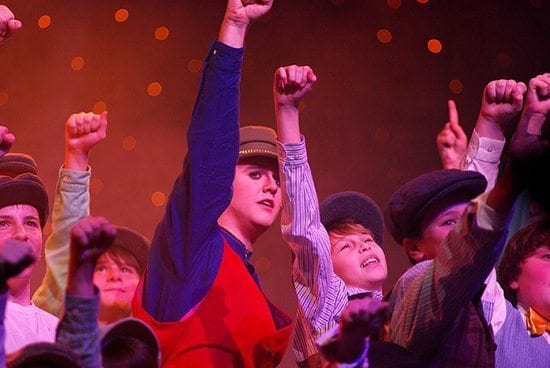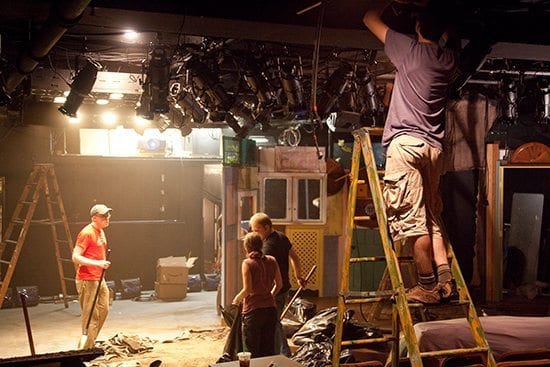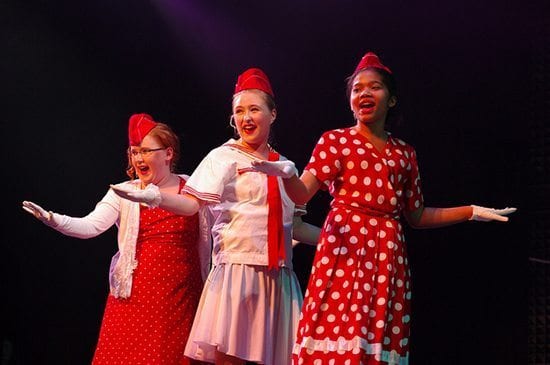It’s opening night of your school’s big theater production—the moment you and your students have been working toward for months! Although everyone hopes the show goes off without a hitch, the reality is that some blunders are bound to occur. Fortunately, more often than not, these theatrical mishaps are more comic relief than catastrophe. And truth be told, the parents secretly love it! While you may never pull off a totally perfect performance, we asked a group of top theater teachers to share their best tips to help you sidestep slipups and set up your show for success. So break a leg!
1. Theater is Inclusive—Not Exclusive
You don’t need an epic cast of hundreds to involve students in theater productions. Kids who aren’t moved by the notion of becoming the next Kristin Chenoweth or Nathan Lane can design scenery or costumes, help backstage or sell tickets. And students who are compelled to try acting often surprise us with their talents when given just a little coaching. “Even those who do not continue in the theater arts still gain self-confidence and lifelong skills,” says Patsy M. Riley of Central Drama Players at Central Elementary School in Mayfield, Kentucky.

2. There’s No Such Thing As Small Parts
Middle schoolers are “dramatic” enough without prima donna drama. It can be easy to let yourself concentrate your attention too heavily on the lead roles. To a degree, this is unavoidable—let’s face it, they have the most lines to learn! But the true success of a show is reliant on all players, big and small, and there are some wonderful plays that feature great parts for everyone, like Shrek JR and Seussical JR, to name two. “You want to develop an ensemble of good actors,” says Spencer Lau, director of music at Woodruff School in Seabrook, New Jersey. “There should be growth for everyone, not just your leads. That’s how you develop a sustainable program.”
3. Consider Your Community
Just because you’ve chosen a Tony Award–winning show doesn’t always mean it’s the best choice for your audience. Even classic stage shows that are adapted specifically for young performers (think Guys and Dolls JR.) can be perfectly acceptable to parents and administrators in one community while considered controversial to those in another community. Broadway Junior lets you read three versions of the print or electronic script before you’ve made your selection, which is key, because it’s a smart idea to read a perusal version of the script to help you understand any potential points of contention before you decide to license a show. Lau also recommends checking in with your principal before making the final decision and says, “This is where a lot of communication is lost. If you are planning a show with any conceived controversy, you need to discuss it with your administration in depth.”
4. Prepare to Juggle
A full-fledged theater production has a lot of moving pieces. From schedules to scenery and communication to costumes, it can feel like you’re doing a juggling act—constantly trying to keep all the balls in the air. Joanne O’Kain, third-grade teacher and musical theater director at Roy Waldron Elementary in La Vergne, Tennessee, says, “I am a huge fan of email communication with teachers, parents and students. I email them each week with the weekly schedule of what scenes and songs we are working on, so kids can be prepared for the rehearsals.” O’Kain shares another tip to stay on track: “I work backwards—take the show dates and figure out how much time it will take to do each scene and song with blocking, choreography and costume changes.”
5. When People Offer to Help, Say Yes!
It’s called a “production” for a reason. Putting on a stage show takes a lot of effort! That’s why you need to seek out assistance wherever you can. “I like to do things on my own because I know it will get done. I’ve had to learn to give trust to others. You cannot do all of this alone,” says Chylo Baun, high school English teacher and co-director of Lakeview School District’s Theater Department in Stoneboro, Pennsylvania. “Ask kids to help in any capacity, and you will be surprised at the results you will get.” Lau not only receives help from students but also parents, teachers and community members. He says, “We work as a team every year to do everything from set building to understanding cultures and time periods, to helping run fundraisers to giving input on students and their reading abilities to putting together program books.”

6. Expand Your Network Finding a strong support group of other theater teachers can be invaluable. O’Kain likes to consult with friends who have done musical theater to see if there are costumes or props she can borrow. If you don’t have a local support system of theater arts colleagues, you can check out Show Support on MTI’s website where you can ask educational theatre expert Cindy Ripley anything about producing your Broadway Junior musical. O’Kain recommends: “Cindy is a great resource. She is willing to help with advice, schedules, management, and costumes.”
7. Breathe! The Show Will Go On!
Even during the most well-rehearsed shows, Murphy’s Law always seems to rear its head—sometimes things just don’t go as planned! Jennifer McLaughlin, theater arts director at Deer Park Junior High School in Deer Park, Texas, once had a lead actor with a very quick costume change for the last scene. After the student undressed, he realized his pants had vanished! In a pinch, the student spotted a pair of McLaughlin’s pants (that really looked more like a long flowing skirt!), and like a pro, he put them on and owned the stage for the final scene. McLaughlin says, “I had to rush to the dressing room, so I could laugh until tears came down my face… However, I could not have been more proud of the fact that he knew that the show must go on even if that means wearing the teacher’s pants!”
This is the fifth article in a six-blog series on Theatre in the Classroom sponsored by Music Theatre International (MTI), the creators of Broadway Junior 30- and 60-minute musicals for young performers. Learn more at broadwayjr.com.

